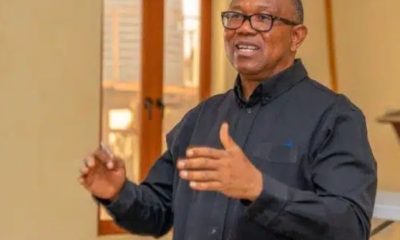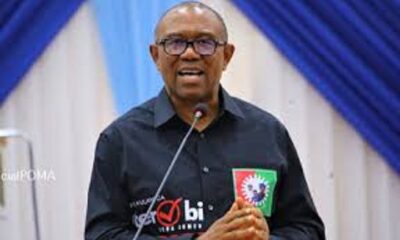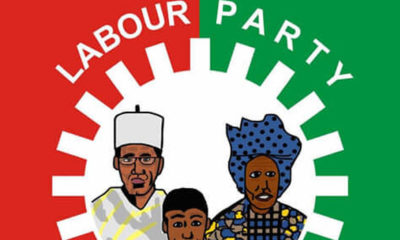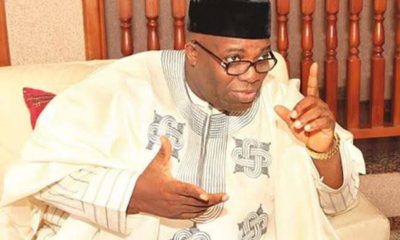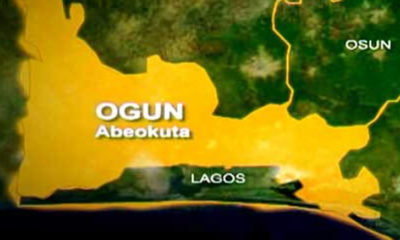Politics
2023: Equity forbids us to support another Yoruba for presidency – Afenifere
… Explains reasons for supporting Peter Obi
By Paul Eso
The apex Yoruba socio-cultural organization, Afenifere, has once again, reiterated its reasons for supporting the presidential bid of Mr. Peter Obi, the Labour Party, LP, standard bearer for the 2023 general elections.
Addressing the media at Wheatbaker Hotel in Ikoyi, Lagos, leader of the Afenifere, Pa Ayo Adebanjo, explained that their support was based on equity and inclusiveness.
According to Adebanjo, “equity forbids us for presuming to support another Yoruba person for the presidency in 2023”, after the South West has produced a president and a vice president respectively.
A speech titled: “Why Afenifere Supports South East Presidential Candidate For 2023 Presidency”, and delivered by the elder statesman read:
“After the primaries and the candidates emerge with Asiwaju Bola Tinubu from the South West, APC, Atiku Abubakar on the platform of PDP and Peter Obi on the platform of Labour Party and I announced Afenifere’s support for Peter Obi, not a few Yoruba leaders question why I should be supporting Peter Obi a candidate of Igbo extraction against Asiwaju Bola Tinubu, a Yoruba.
Read also>>>UNBELIEVABLE! Serving PDP Senator, Nnamani Emerges Member Of Tinubu’s Campaign Council
“I took my time to explain that the presidency is not a contest between the Yorubas and the Igbos and to a large extent I was able to convince many. But ever since social media has been filled with comments tending to ethnicize the campaign instead of making it issue-based.
“Afenifere has therefore decided to address you today and through you educate the public on the ideological and equitable principles which have influenced our decision.
“In the countdown to the 2023 General elections, long before the parties conducted their Conventions to elect their National Executives and candidates, we had insisted and still advocate restructuring before the elections proposing a synthesis of the identical Resolutions of the 2014 National Conference and the APC El Rufai 2018 True Federalism Committee.
“We did this as Afenifere and on the wider spectrum of the Southern and Middle Belt Leaders Forum (SMBLF). We did this, when politicians, in spite of the monumental crises confronting the nation, carried on as if the attainment of power was all that mattered, the SMBLF unanimously proposed that the minimum condition for a peaceful transition from the disastrous 8years of Buhari’s government headed by a President of northern extraction was to have the next President from the South.
“This position was also supported by all the southern governors, irrespective of their political parties at a meeting held in Asaba, Delta State.
“Incidentally, this North/South consideration which is at the very root of our amalgamated federation is also the most important testament of all political parties in Nigeria. The principle of federal character enshrined in the constitution dictates that the government of the federation or any part thereof shall not be concentrated in any ethnic group or a combination of such groups.
“It is therefore preposterous to adopt this principle for employment in public service admissions in educational institutions, political appointment, the composition of the executive committee of a political party only to jettison it in the most important question of rulership of the federation.
“In this quest for peace, based on equity and inclusiveness, the Yoruba took the first turn at the zoning arrangement in 1999, and that led to the emergence of Chief Obasanjo, the current Vice President is a Yoruba man and equity forbids us for presuming to support another Yoruba person for the presidency in 2023.
“The current President is a Fulani from the Northwest and by virtue of the zoning arrangement that has governed Nigeria since 1999, power is supposed to return to the south imminently. The southwest as I have pointed out has produced a president and currently sits as VP, the South-South has spent a total of 6years in the Presidency, but the Igbo people of the South-East have never tasted presidency in Nigeria, and now that the power is due back in the South equity demands that it be ceded to the Igbo.
“We cannot continue to demand that the Igbo people remain in Nigeria, while we at the same time continue to brutally marginalize and exclude them from the power dynamic.
“Peter Obi is the person of Igbo extraction that Afenifere has decided to support and to back, he is the man we trust to restructure the country back to federalism on the assumption of office.
“We will not compromise this principle of justice, equity and inclusiveness because one of our own Asiwaju Bola Tinubu is a frontline candidate.
“It is on this same principle, we condemn the PDP for sponsoring Atiku Abubakar, a Northern Fulani Muslim to succeed General Muhammadu Buhari another Fulani Muslim who will soon complete 8 years of uneventful and disastrous rule. One can imagine such a high degree of political insensitivity.
“On our part, we are certainly not alien to sacrificing personal interests in the quest for a National coalition to put Nigeria on the proper pedestal.
“In this regard, the starting point is Southern solidarity for which we first enacted a handshake across the Niger, which had dovetailed to the Southern and Middle Belt Leaders Forum. We enjoin the labour movement, students, youth organisations, women associations, and every institution whose foundation is built on fairness and justice to join hands in this task of enthroning a democratic government by supporting Peter Obi. If we are sincere and honest about keeping Nigeria together in peace, the slogan henceforth should be: ‘To keep Nigeria one, everyone should be Obi/Datti compliant.’
“In the final analysis, let it be said that we have no apologies but due courage of our conviction that Nigeria can only prosper in righteousness.
“For me, in the twilight of my sojourn on earth at 94, it is too late to derail me on the track of true federalism and National inclusiveness on which I have travelled for over 70 years of my life as one of the few surviving initial prophets, I prefer to ascend on a chariot of fire, fueled by justice and equity.”
Politics
Edo Considers Arresting Sponsors Of Armed PDP Thugs

With the wave of insecurity unrelenting and the belief that it has a political undertone, the Edo State Government is contemplating arresting those sponsoring what it described as ‘touts in possession of over 5,000 illegal arms in Edo State’.
This was detailed in a press statement on Sunday in Benin City by the Chief Press Secretary to the Edo State Governor, Fred Itua.
According to Itua, the state government would no longer condone the menace of illegally armed political thugs and touts, so would not hesitate to unveil the mask to pick up those behind the non-state actors of a particular political party, disturbing the peace of the state.
He wrote, “The Edo State Government is gravely concerned about the rising wave of insecurity fuelled by armed thugs and criminal elements associated with the opposition Peoples Democratic Party (PDP).
ALSO READ: Ohanivo Upbeat As Sen Umahi Emerges Silverbird’s Most Outstanding Minister Of The Year
“These individuals, who were heavily armed before the 2024 Edo Governorship Election, have refused to surrender their weapons, posing a clear and present danger to the safety of our citizens.
“It is on record that former Governor Godwin Obaseki, before the last election, openly threatened that “Nigeria would burn.” This was not a mere political outburst — it was a premeditated declaration backed by the systematic arming of touts and thugs.
“These individuals, many of whom were drafted into the Edo State Security Network under the previous administration, still possess over 5,000 illegal firearms, which they now use to perpetrate robbery, kidnapping, and violent attacks across the state.
“The Edo State Government is aware that PDP leaders, who had direct control over these armed operatives, have refused to assist in disarming them. Instead, they continue to shield these criminals, providing them with cover as they unleash terror on innocent citizens.
“Worse still, intelligence reports indicate that PDP leaders are stockpiling additional arms, with the intention of orchestrating mayhem should their candidate, Asue Ighodalo, fail to secure victory at the Tribunal.
“The State Government is calling on all security agencies to intensify their investigations, track down these armed criminals, their sponsors and bring them to justice.
“No individual, regardless of political affiliation, is above the law, and Edo State, under the leadership of Governor Monday Okpebholo, will not tolerate any attempt to destabilize the peace and security of our people.
“We urge law enforcement agencies to move swiftly and ensure that all illegally possessed firearms are recovered, and those responsible for the current state of insecurity in Edo are held accountable.
“The security and well-being of Edo people remain Governor Okpebholo’s utmost priority, and he will not allow politically sponsored violence to take root in our State.”
Politics
JUST IN: Jandor Dumps PDP, Returns To APC
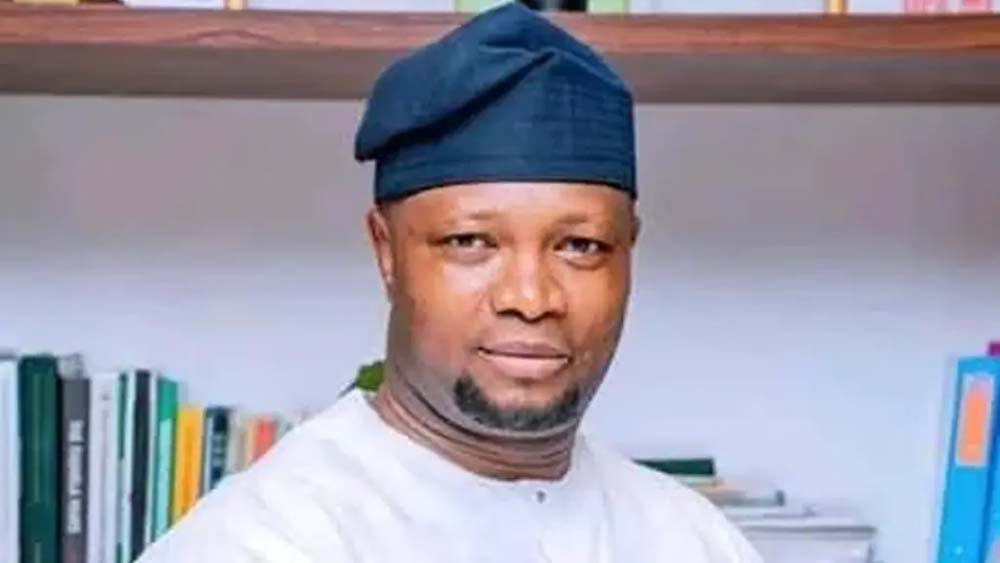
Former Lagos State governorship candidate of the Peoples Democratic Party (PDP), Dr. Abdul-Azeez Adediran, popularly known as Jandor, has officially defected to the All Progressives Congress (APC).
Jandor announced his return to the ruling party on Monday during a press conference at his office in Ikeja, Lagos.
His decision comes weeks after resigning from the PDP, citing internal crises and a lack of party discipline as key reasons for his departure.
READ ALSO: Ex-Lagos PDP Flagbearer Jandor Dumps Party
“Our story in the PDP was a case of working with perennial political saboteurs,” Jandor stated. “We have resolved to love our future much more than we hate our past.”
According to Jandor, the PDP’s failure to address anti-party activities during the 2023 general elections led to his decision. He expressed frustration over what he described as a pattern of betrayal within the party.
He also emphasized that his move to the APC followed extensive consultations with family, political associates, elder statesmen, and well-meaning Lagosians.
“The primary reason a political party exists is to win elections and form a government to serve the people. We have decided to join a party that prioritizes winning for its members, regardless of who is on the ballot,” he said.
Before settling for the APC, Jandor revealed that he engaged in discussions with leaders from other political parties, including the Social Democratic Party (SDP), African Democratic Congress (ADC), and Young Progressive Party (YPP).
Addressing concerns about his previous exit from the APC, Jandor likened his political journey to a Yoruba adage about learning from different experiences.
“In APC, we have a leader who, even if you fault his choices, is determined to win for the party and its members. In Lagos PDP, however, we had a leader who, at every election cycle, worked against his own party and dashed the hopes of many,” he said. “We have chosen the better alternative.”
Jandor acknowledged the role of key figures in persuading him to rejoin the APC, particularly President Bola Tinubu’s Chief of Staff, Femi Gbajabiamila, and Tinubu’s son, Seyi Tinubu.
“I must recognize the relentless efforts of Rt. Hon. Femi Gbajabiamila, who has been on my case for over a year to return home and join hands with Mr. President,” he said. “Upon hearing of my resignation from the PDP, Seyi Tinubu immediately reached out and urged me to come back home.”
Jandor assured his supporters that his move was in Lagos’ best interest and urged them to follow him into the APC.
“We remain committed to the values of service, integrity, and progress. Together, we will continue to champion the cause of a better Lagos for present and future generations,” he declared.
Politics
No Political Gang-Up Can Stop Tinubu’s Re-Election In 2027 – APC Chieftain

A chieftain of the All Progressives Congress (APC), Olatunbosun Oyintiloye, has dismissed fears that recent defections from the ruling party will affect President Bola Ahmed Tinubu’s chances of securing re-election in 2027.
Speaking in Osogbo on Sunday, Oyintiloye described the ongoing political realignments as inconsequential, insisting that Tinubu has a “winning strategy” to counter any opposition at the right time.
His comments come amid reports that former Kaduna State Governor, Nasir El-Rufai, has defected to the Social Democratic Party (SDP) and is reaching out to former APC stalwarts, including Rauf Aregbesola, to join him.
READ ALSO: El-Rufai Abandons APC, Says Party No Longer Represents Progressives
Despite this, Oyintiloye maintained that defections are a normal part of politics and would not derail the president’s re-election bid.
“Take it or leave it, no amount of political gang-up can stop the re-election of President Tinubu in 2027. Those who are gathering against him should study the kind of person he is,” Oyintiloye said.
He further argued that Tinubu’s achievements, political acumen, and goodwill across the country would secure him victory in the next election. According to him, the president is making deliberate efforts to put Nigeria on the path of greatness, and these efforts are already yielding positive results.
“The president will succeed, and his political enemies will soon realise their mistake in opposing him,” he added.
While expressing confidence in Tinubu’s chances, Oyintiloye urged the president to intensify public engagement and sensitisation efforts to showcase his administration’s achievements and future projections.
With political tensions rising ahead of the 2027 elections, Tinubu’s camp remains optimistic about his chances, despite defections and emerging opposition alliances.

